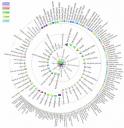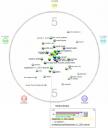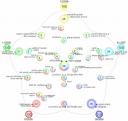A paper (that I found only recently) summarizes the responsibility of authorship in the life sciences. Sharing publication- related data is a key element of the life sciences and there is concern that in practice materials are not always readily available to the research community. U-P-S-I-D-E stands for “uniform principles for sharing integral data and materials expeditiously”. The authors come from major U.S. universities and companies and have developed 10 recommendations that should be in the curriculum of every PhD program – go to the executive summary at www.plantphysiol.org/cgi/doi/10.1104/pp.900068
Category Archives: Philosophy
Wormy world
Allergy (or at least an associated trait) may have its roots somewhere in Africa – where helminth infections are frequent. A new Nature Immunol Review has an overview but I am quite disappointed. From the abstract Continue reading Wormy world
The second largest problem in epidemiology
Having identified earlier the largest problem in epidemiology I trying now to identify the second most relevant problem. Hopefully I can do it by just one sentence: Continue reading The second largest problem in epidemiology
Errare humanum est
All4quotes and becontent have (mainly German) quotes. My all time favorites are
Aurelius Augustinus: Irren ist menschlich, aber aus Leidenschaft im Irrtum zu verharren, ist teuflisch.
August von Kotzebue: Menschen irren, aber nur große Menschen erkennen ihren Irrtum.
Christian Friedrich Hebbel: Die Menschheit läßt sich keinen Irrtum nehmen, der ihr nützt.
Friedrich von Schiller: Liegt der Irrtum nur erst, wie ein Grundstein, unter dem Boden, immer baut man darauf, nimmermehr kömmt er an den Tag.
Friedrich von Schiller: Hundertmal wer ich’s euch sagen und tausendmal: Irrtum ist Irrtum! Ob ihn der größte Mann, ob ihn der kleinste beging.
Georg Christoph Lichtenberg: Nur der Betrug entehrt, der Irrtum nie.
Search for crystals
First monday has an interesting paper on the 100 most visited Wikipedia pages for the period of September 2006 to January 2007 (Wikipedia is the ninth most visited site in the U.S. with 43 million visitors). The crystal search link in the paper does not work but the table reports that science ranks at place 5 – not too bad.



Show me your desk
Salutogenesis
I am still thinking about coping and resilience, and have read again Antonovsky‘s salutogenesis concept of a continuum between health and disease.
If we are not lucky to find any risk factor Continue reading Salutogenesis
Raising meteors
The BMJ blog has a comment on “raising meteors” and other intelligent study acronyms. I will never understand how all this trials are being connected – maybe somebody could create a map like the famous Biochemical Pathway Maps by Roche?
Hypomania
The Lancet has a comprehensive review of bipolar disorders- finally I learned about the distinction between type I (includes mania) and type II (hypomania). BTW the author thinks that there is no sound evidence for the DSM-IV priority for mood changes; Kraepelin had no priority for mood, thinking or activity altering changes after all). Continue reading Hypomania
Research on totalitarism
Süddeutsche Zeitung reports that the Hanna-Arendt Institute for Research on Totalitarism has dismissed its director as three quarter of the scientific staff now voted against him. This seems to be a quite unusual case that the scientific staff has such a strong voice – I can’t renember so many other cases in the hierarchical academic system.
My avatar
Sorry, can’t tell you anything about user dungeons and don’t have any second life avatar (only various nicknames at various sites). Has anybody experience with science there?
Even universities are jumping in this field for example the UIC with Virtual Reality for Virtual Eternity. Continue reading My avatar
Gary Taube’s limits and my interest in molecular epidemiology
Curative medicine contributes only 10% to 40% to individual health (figures are depending on models and methodology according to a recent commentary in the Deutsche Ärzteblatt, for milestones check the BMJ) – a reason why I finally decided to become an epidemiologist. Continue reading Gary Taube’s limits and my interest in molecular epidemiology
Antedisciplinary Science
.. another thoughtful essay by Sean Eddy in PLOS Computational Biology cites the NIH Roadmap Initiative
The scale and complexity of today’s biomedical research problems demand that scientists move beyond the confines of their individual disciplines and explore new organizational models for team science. Advances in molecular imaging, for example, require collaborations among diverse groups—radiologists, cell biologists, physicists, and computer programmers.
which sounds great like all interdisciplinary science but has also all the drawbacks (“to temper the wind to the shorn lamb” seems to be the English translation of the German “weakest ring of the chain”).
Progress is driven by new scientific questions, which demand new ways of thinking. You want to go where a question takes you, not where your training left you.
Sure, the game is more about interdisciplinary people than interdisciplinary teams
A motley crew of misfits
and not EU accountants drive progress.
How much do you think a scientific blog post is worth
(in US dollars) asks Pimm – the partial immortalization blog. A first response to this question -based on Google adsense revenues- is about $0.47/post. I think that prices depend on context – from negative balance (wasted time) to a new research direction (+tenure +$100,000) there is everything possible.
Science dresscode
Sciencesque has noticed it first: T shirts at Biomed Central for sale. Do your really want that shirt?

